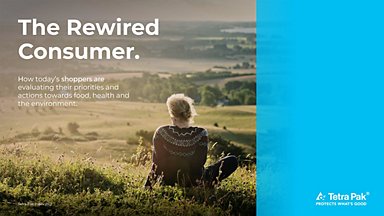Online grocery goes mainstream
The pandemic has accelerated online grocery take-up, with over half of respondents now saying they buy food and beverages online. Around 40% of total online buyers say they started since the pandemic – and those who shopped online already are now doing so even more. While 57% of new online shoppers say they started because they wanted to avoid crowds, now there is widespread appreciation of the benefits – notably convenience, with choice and cost rated lower.
There is no going back, it seems, with 80% saying they will continue in future. Social media is the most common source of product information for consumers buying online, and carton is the preferred packaging material.
Online shopping mirrors offline habits in a number of interesting ways. Nearly 80% say their purchases are planned, with nearly half saying the driver is the traditional weekly/monthly shop. Moreover, the preferred channel is a supermarket or convenience store site (48%), rather than any kind of specialist online platform. Clearly, these are trusted retailers – and that trust extends to their products, too. Trust for private label is strikingly high online, cited by three-quarters of respondents especially for dairy, plant-based and other beverages.
Opportunity: Impulse appeal
Brand matters less online than it does offline: consumers tend to be less loyal, with almost 40% saying they are more open to experiment when buying via digital devices. Moreover, with more than 20% of online grocery purchases made on impulse, there are clear opportunities for products with instant appeal. The main impulse purchase drivers are attractive prices or promotions. But positive product ratings/reviews also play a key role, mentioned by a third of respondents. About the same number also cite the recommendation of the online grocery website, suggesting that a good, customised tip can nudge a purchase.
Case study: Adopt A Cow, China

Adopt A Cow is a fast-growing direct-to-customer dairy company in China. Founded in 2016, it has built an integrated dairy supply chain from cow breeding, pasture plantation and feed processing to dairy production and sales and distribution. Its focus on product quality and safety, and its well-established digital sales strategy – including partnerships with opinion leaders, Tmall and other prominent e-commerce and social media platforms – have won the trust and loyalty of more than 10 million customers.
The company has continuously doubled its sales every year over the past three years, and achieved over RMB100 million in sales during “Double Eleven” – the world’s biggest sales festival – in 2020 from its Tmall flagship store alone, establishing Adopt A Cow as the #1 selling dairy brand for the event. Currently, around 80% of its sales are via e-commerce, with around 80% of its products packaged in Tetra Pak portfolio, selected to differentiate its offering online and to underpin its trusted brand image.


